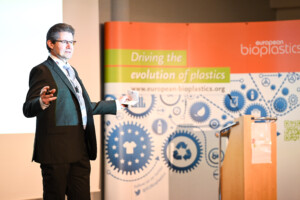 It was perfect timing for the 17th annual European Bioplastics (EUBP) Conference, which took place on 6/7 December in Berlin. Throughout the whole year, bioplastics already had been a permanent topic in the debate over innovation drivers in the plastics industry and the political discussion in Brussels. Like in any good blockbuster, the story peaks towards the end of the movie. With the publication of its proposal for a Packaging and Packaging Waste Regulation (PPWR) and the first policy framework for bioplastics on 30 November, the European Commission, for sure involuntarily, helped to set the excellent scene for this year’s EUBP Conference.
It was perfect timing for the 17th annual European Bioplastics (EUBP) Conference, which took place on 6/7 December in Berlin. Throughout the whole year, bioplastics already had been a permanent topic in the debate over innovation drivers in the plastics industry and the political discussion in Brussels. Like in any good blockbuster, the story peaks towards the end of the movie. With the publication of its proposal for a Packaging and Packaging Waste Regulation (PPWR) and the first policy framework for bioplastics on 30 November, the European Commission, for sure involuntarily, helped to set the excellent scene for this year’s EUBP Conference.
Thus, during the two conference days with ten different sessions and over 40 speakers and moderators over 360 industry experts, in person and online, extensively discussed the latest innovations in the bioplastics sector and successfully drove the debate on most recent political developments. Especially the political debate over the adequate framework conditions for bioplastics was a recurring subject in many of the conference sessions. Here both experts and policymakers agreed that the regulatory environment for bioplastics requires a continuous close cooperation between industry and politics.
In his opening remarks, Stefan Barot, Chairman of European Bioplastics (EUBP), emphasized the leadership role of the European Union (EU) in addressing the existing environmental challenges. He focused on the EU’s promotion of a circular economy to achieve European climate neutrality by 2050 and the contribution bioplastics can make to achieve this goal. “Bioplastics with their beginning of life and end of life advantages and their special material properties have a lot to offer. The same goes for the industry, an important player in the technical and political debate. However, to use its full potential to support the EU climate objectives and to foster innovation, our industry needs a future-oriented, clear, and transparent economic and regulatory environment,” said Barot.
The conference sessions, amongst other topics, highlighted best practices in food waste collection, showed new directions in bioplastic innovation, and gave a global perspective on standardisation. The policy panel further elaborated on the role of especially compostable plastics in the circular economy. In other sessions, conference attendees also discussed end of life options of biobased and compostable plastics and their benefits. Further topics were recent advances in bioplastic packaging and innovative applications towards sustainability. New European Bioplastics market data, based on research from the nova-institute, gave a positive outlook for bioplastics production. “The global bioplastics production capacity is set to increase significantly from around 2.23 million tonnes in 2022 to 6.3 million tonnes in 2027,” said Hasso von Pogrell, Managing Director of EUBP.
The conference also hosted a large exhibition, where around 30 companies and institutions showcased the high diversity of new products, materials, and applications. As innovation also requires research, the industry event was complemented by a poster exhibition with 14 different universities and research institutes presenting bioplastics-related projects.
While the last two conferences were affected by the pandemic, European Bioplastics as well as this year’s attendees very much appreciated the return to normality. The high number of participants that attended the conference in person (over 300) clearly showed the great importance of personal encounters. Therefore, we are already looking forward to the 18th European Bioplastics Conference towards the end of 2023.